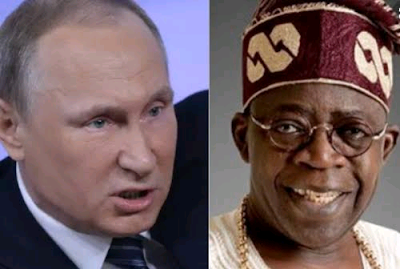RUSSIA SENDS STRONG WARNING TO TINUBU, ECOWAS.
Amid the ongoing political turmoil in Niger following a recent coup, Russia has issued a strong caution to the Economic Community of West African States (ECOWAS) concerning the possibility of military intervention in the region. ECOWAS leaders convened in Abuja to discuss the restoration of constitutional democracy and the reinstatement of President Mohamed Bazoum, who was ousted during the coup. The situation is multifaceted, and Russia's perspective has added complexity to the discussion.
Bola Ahmed Tinubu, the President of Nigeria and the chair of ECOWAS, has proposed various options to address the crisis, including the potential use of force as a last resort. However, Russia has expressed concerns about the potential consequences of a military approach. The Russian foreign ministry has warned that military intervention could lead to a prolonged conflict within Niger, worsening the crisis. Moreover, Russia has emphasized that such an approach might trigger destabilization across the entire Sahara-Sahel region.
A noteworthy aspect of this situation is that the coup leaders in Niger have not received official support from Russia. However, some of their supporters staged demonstrations near a French military installation close to Niamey, displaying Russian flags and calling for France and ECOWAS to step back. This development highlights the complex geopolitical landscape surrounding the coup, with potential global implications.
The presence of foreign military bases operated by France and the United States in Niger adds further complexity to the situation. These bases have been instrumental in launching operations against rebel groups in the surrounding regions, contributing to the intricacies of the ongoing crisis.
In essence, Russia's warning underscores the importance of cautious and strategic decision-making by ECOWAS and its member states. The combination of various geopolitical interests, the potential ripple effects on the broader region, and the complexities of internal governance highlights the intricate web of factors at play in the aftermath of the Niger coup.
The root of the crisis in Niger lies in the recent coup, which resulted in the removal of President Mohamed Bazoum. The coup leaders justified their actions by citing alleged corruption and mismanagement within the government. However, their actions have drawn widespread international condemnation, with calls for a swift return to constitutional democracy.
The aftermath of the coup has left a power vacuum and a struggle for control, further exacerbating instability in Niger. In response, ECOWAS has taken a proactive stance, seeking to restore constitutional order and reinstate the ousted president. Nonetheless, Russia's warning serves as a reminder of the potential repercussions of military intervention.
Russia's caution regarding a military solution highlights the gravity of such an approach. The Russian foreign ministry is concerned that military action could lead to an extended and intensified conflict within Niger itself, making the crisis even more challenging to resolve. Additionally, Russia warns of the wider implications, specifically the potential destabilization of the Sahara-Sahel region, should military action be pursued.
What's intriguing is the involvement of Russia in this complex geopolitical landscape. While Russia has not officially supported the coup leaders, the presence of Russian flags and calls for France and ECOWAS to withdraw during protests near a French military base raise questions about Russia's involvement, either directly or indirectly.
The intricate geopolitical dynamics suggest that there may be more to this situation than meets the eye. Russia's interests in the region could encompass a range of factors, including economic ties and political influence. Understanding Russia's position and motivations is crucial for ECOWAS and the international community as they navigate the path toward stability in Niger.
The presence of foreign military bases in Niger operated by France and the United States adds another layer of complexity. Both countries maintain military installations in the country, which have been instrumental in launching operations against rebel groups in the surrounding regions. France, in particular, has a robust military presence in the Sahel region, aiming to combat terrorism and stabilize the area.
In conclusion, the warnings issued by Russia against a military solution in Niger emphasize the need for careful and strategic decision-making by ECOWAS and its member states. The interplay of various geopolitical interests, the potential ramifications across the broader region, and the intricacies of internal governance highlight the intricate web of factors at play in the aftermath of the Niger coup. ECOWAS faces a formidable challenge in navigating this complex terrain, and diplomacy and dialogue should remain the primary tools for resolving the crisis and restoring stability to the region.








0 Comments